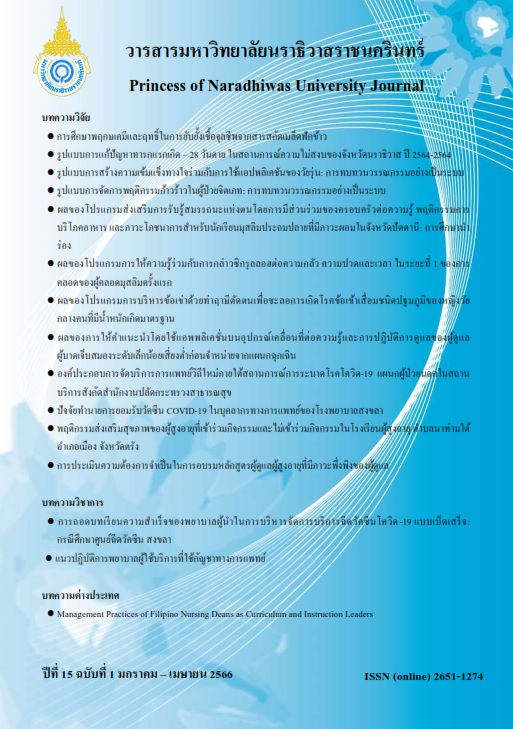Factors Predicting COVID-19 Vaccine Acceptance among Health Care Workers of Songkhla Hospital
Keywords:
Prediction factor, COVID-19 vaccine, Acceptance, Health care workersAbstract
This research is a cross-sectional analytic study aiming to investigate factors predicting COVID-19 vaccine acceptance among health care workers of Songkhla hospital. Data were collected between February 1st and April 30th, 2021 through questionnaire. The content validity of the IOC for each variable was between 0.6 - 1.0, and Cronbach's Alpha was 0.85. The data were analyzed by descriptive statistics; number, percentage, mean and standard deviation. The factors predicting COVID-19 vaccine acceptance were analyzed using Stepwise Multivariate linear regression statistics at a confidence level of 0.05. The results showed that among 488 health care workers, only 56.56% had positive opinion towards the vaccine. The predicting factors for accepting the COVID-19 vaccine were seasonal influenza in past years, recommendations from trustworthy persons, having received vaccine without any side effect, Male, office personnel, the risk of contracting COVID-19 while working is reduced, marital status, reduced the new cases. Which can predict 30.00% at p-value = 0.001
Building vaccine acceptance among health care workers should target on those who have not received seasonal influenza vaccination in the past year, or those who had side effect from receiving influenza vaccine, personnel taking care of patients, female, single. In addition, recommendations from trusted persons may help people realize advantages of the vaccine, for example, reducing patients and infection risks.
References
Cohen, J. (1988). Statistical power analysis for the behavioral sciences. Hillsdale, New Jersey: Lawrence Erlbaum Associates.
Desye, B (2022). Prevalence and Determinants of COVID-19 Vaccine Acceptance Among Healthcare Workers: A Systematic Review. Front. Public Health 10:941206.
Faul, F., Erdfelder, E., Lang, A.G., & Buchner, A. (2007). G*Power 3: A flexible statistical power analysis program for the social, behavioral, and biomedical sciences. Behavior Research Methods, 39(2), 175-191.
Gadoth, A., Halbrook, M., Martin-Blais, R., Gray, A., Tobin, N., Ferbas, K., … Rimoin, A. (2020). Assessment of COVID-19 vaccine acceptance among healthcare workers. in Los Angeles.
Hair, J.F., Black, B.B., Babin, B.J., & Anderson, R.E. (2010). Multivariate Data Analysis: A global perspective 7th ed. New Jersey: Pearson Printice Hall.
Kabamba, N.M., Kabamba, N.L., Ngoie, M.G., Banza, D. B., Mbidi, M.J., Luhata, LC., … & Mukamba, M.E. (2020). Acceptability of Vaccination Against COVID-19 Among Healthcare Workers in the Democratic Republic of the Congo. Pragmatic and observational research, 11, 103–109.
Lazarus, J., Ratzan, S., Palayew, A., Gostin, L., Larson, H., Rabin, K., … El-Mohandes, A. (2021). A global survey of potential acceptance of a COVID-19 vaccine. Nature Medicine, 27(2), 225-228.
MacDonald, N. E. (2015). Vaccine hesitancy: Definition, scope and determinants. Vaccine, 33(34), 4161–4164.
Nasiri, M.J., Haddadi, S., Tahvildari, A., Farsi, Y., Arbabi, M., Hasanzadeh, S., Jamshidi, P., … Mirsaeidi, M. (2020) COVID-19 Clinical Characteristics, and Sex-Specific Risk of Mortality: Systematic Review and Meta-Analysis. Front. Med. 7:459.
Nguyen, T., Holdt, H.K., Brehaut, J.C., Hoe, E., Wilson K. (2011). Acceptance of a pandemic influenza vaccine: a systematic review of surveys of the general public. Infect Drug Resist. 4, 197-207.
Randolph, H. E., & Barreiro, L. B. (2020). Herd Immunity: Understanding COVID-19. Immunity, 52(5), 737–741.
Wang, J., Jing, R., Lai, X., Zhang, H., Lyu, Y., Knoll, M. D. & Fang, H. (2020). Acceptance of COVID-19 Vaccination during the COVID-19 Pandemic in China. Vaccines, 8(3), 482.
Wang, K., Wong, E., Ho K. F., Cheung, A., Chan, E., Yeoh, E. K. & Wong, S. (2020). Intention of nurses to accept coronavirus disease 2019 vaccination and change of intention to accept seasonal influenza vaccination during the coronavirus disease 2019 pandemic: A cross-sectional survey. Vaccine, 38(45), 7049–7056.
Wang, L., Wang, Y., Cheng, X., Li X., Yang, Y. & Li, J. (2022). Acceptance of coronavirus disease 2019 (COVID-19) vaccines among healthcare workers: A meta-analysis. Front. Public Health 10:881903.
World Health Organization. (2021)(a). COVID-19 vaccine tracker and landscape. Retrieved February 12, 2021 from https://www.who.int/publications/m/item/draft-landscape-of-COVID-19-candidate-vaccines
World Health Organization. (2021)(b). IHR Emergency Committee on Novel Coronavirus (2019-nCoV). Retrieved February 12, 2021 from https://www.who.int/director-general/speeches /detail/ who-director-general-s-statement-on-ihr-emergency-committee-on-novel-coronavirus -(2019-ncov)
World Health Organization. (2021)(c). WHO's 'Vaccine Explained' series. Retrieved November 28, 2022 from https://www.who.int/emergencies/diseases/novel-coronavirus-2019/covid-19-vaccines/explainers
Youssef, D., Abou-Abbas, L., Berry, A., Youssef, J., Hassan, H. (2022). Determinants of acceptance of Coronavirus disease-2019 (COVID-19) vaccine among Lebanese health care workers using health belief model. PLoS ONE, 17(2): e0264128.
Additional Files
Published
How to Cite
Issue
Section
License
Copyright (c) 2023 Princess of Naradhiwas University Journal

This work is licensed under a Creative Commons Attribution-NonCommercial-NoDerivatives 4.0 International License.




